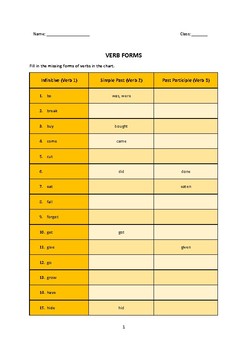
Check your understanding by hovering over the info bubbles for simple explanations and handy tips.
#Ver past participle plus#
Each grammar topic comes with one free exercise where you can review the basics, as well as many more Lingolia Plus exercises where you can practise according to your level. The past participles of all regular verbs end in ed, but the past participles of irregular verbs vary considerably. In the passive, we form the p erfect participle with having been + past participle Example: Having been left on the meadow by the farmer, the sheep ran around all day.

We can use participles to form participle clause s which shorten complex sentences. There are three kinds of participles in English grammar: present participle or -ing form, past participle and perfect participle. In the active, we form the perfect participle with having + past participle Example: Having run around on the meadow all day, the sheep were tired. Participles are verb forms that function as adjectives, nouns or as part of a compound verb tenses. The perfect participle can be used in both the active and the passive. Having run around on the meadow all day long, they were tired. … the action takes place over a longer period of time until another action.Įxample: They had been running around on the meadow all day long so that they were tired.
#Ver past participle full#
→ Having eaten so much grass, they were full up.
#Ver past participle how to#
Perfect Participle How to use the perfect participle → The sheep were just standing there wagging their tails.

Go dancing/shopping/swimming/walking/… Example: I often go walking in the countryside.


 0 kommentar(er)
0 kommentar(er)
